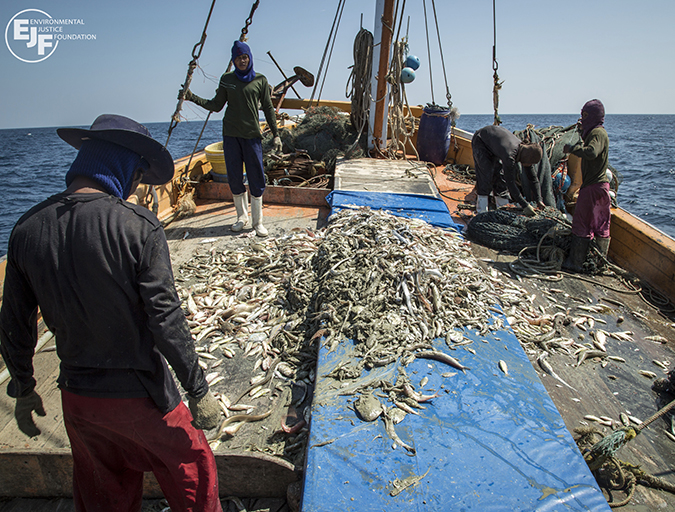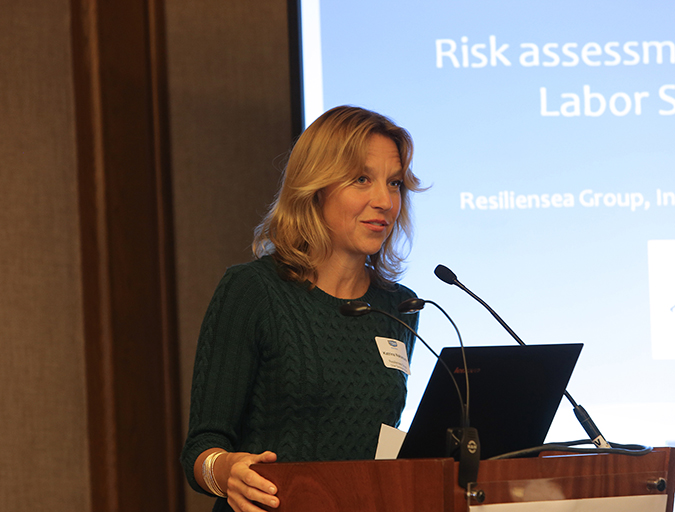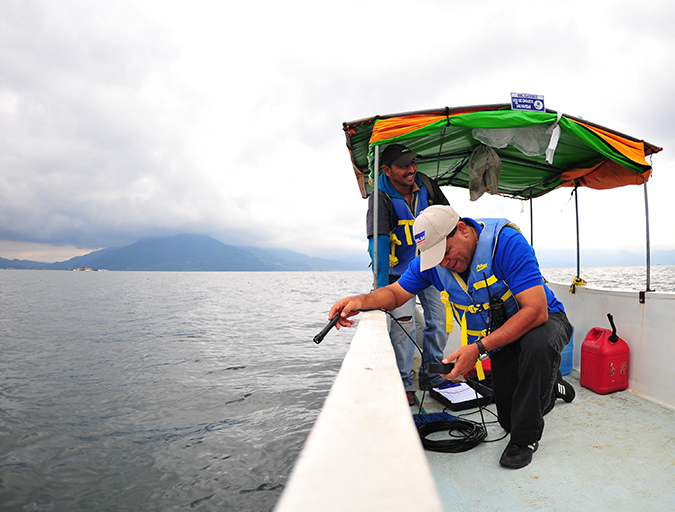‘Ghost Fleet’ star and Seafood Champion shares inspirational stories of survival as event tackles social responsibility challenges

Patima Tungpuchayakul has helped to rescue more than 5,000 Thai and migrant workers throughout Southeast Asia from dangerous and abusive working conditions on fishing vessels.
While there have been improvements in recent years, many thousands of others may still be toiling away as modern-day slaves, wanting desperately to go home to their families, she said at the SeaWeb Seafood Summit in Bangkok.
“It would be very difficult to quantify, definitely, the number,” she said. “Reality is indeed very cruel. Some people have been away [from home] for 24 years.”
Tungpuchayakul, founder of the Labour Rights Promotion Network Foundation, was recognized as a Seafood Champion at the previous year’s event for her considerable efforts to root out forced labor in Thailand’s fishing sector (she was also nominated for a Nobel Prize in 2017). Her work is the focal point of a 2018 documentary, “Ghost Fleet,” a portion of which was shown at the event’s opening seminar. It depicts the brutal conditions that thousands of workers have forced to endure, as well as the courageous efforts to free them.
Many of the workers were deceived into taking employment opportunities that turned out to be nightmares. Tungpuchayakul brought to the Summit some of the freed fishermen to share their experiences, including Luang Por Prasert, who has become a Buddhist monk at a temple in Yasothon Province since being freed after more than five years at sea.
Yes, we love fish. But we also love people.
Por Prasert’s told the audience that he was often beaten by the vessel captain and that he eventually lost an eye in an accident, for which he was forced to accept a settlement of just 100,000 Thai baht (roughly $3,000) after being awarded nearly twice that amount. Some of his fellow workers, rather than enduring whippings, work round-the-clock shifts and take drugs to keep them awake, chose instead to throw themselves overboard.
Tungpuchayakul said the documentary provides visual proof that slave labor exists in the fishing industry, initially exposed in a 2014 Guardian exposé and again by the Associated Press in late 2015, which won a Pulitzer Prize for its “Seafood from Slaves” series.
“The greatest news of this movie is now their voices are heard,” she said. “Consumers should be assured that their seafood was not caught by slave labor. Companies in Thailand have become more active in cleaning up the supply chain. We have witnessed their efforts in preventing child labor and increasing worker voice in providing avenues for grievances. We started with zero laws to protect fishermen. We have to admit that working conditions have improved, but efforts must be sustained and continuous.”
Amplifying worker voice
Led by U.S.-based NGO FishWise, the pre-conference seminar held on Monday took a deep dive into the establishment of worker voice mechanisms – such as the right to unionize, to engage in collective bargaining and to report abuses.
Tobias Aguirre, executive director of the California-based group, said it was clear that seafood sustainability was no longer just about the environment.
“Yes, we love fish. But we also love people,” he said. “We have a hell of a lot of work to do. Let’s leave this summit more committed to this work than ever before.
Jen Cole, a human- and labor-rights project manager at FishWise, said the term “worker voice mechanism” is a means for fishermen to provide feedback, air grievances and share experiences to their employers, without fear of retribution. In short, it’s a mechanism for remediation, which had simply not existed in Thailand prior to the unprecedented media coverage.
It’s about dignity and justice for workers worldwide.
“It’s doing what is in your power to right the wrongs you’ve discovered,” said Cole.
Jarret Basedow of the Issara Institute discussed the safeguards and protections established for workers in Thailand, including a migrant worker helpline and a Golden Dreams smartphone app that provides messaging platforms. He added that 45,336 workers in supply chains (including seafood) have benefited from improvements in working conditions through remediation efforts that depend on collaboration from employers.
“It’s about dignity and justice for workers worldwide,” he said. “Workers should be protected from anti-union discrimination. Being part of a union should not affect their ability to get or keep a job.”
Only Thai nationals are permitted to form a union, he explained. Migrant workers can join, but the overall concept is not common in the region. “It’s not traditional to criticize superiors,” he said, given the possible threat of deportation, prosecution and criminal defamation. “It’s an environment where workers are afraid to speak out.”
Basedow and others urged Thailand to allow all workers the right to organizes and collectively bargain; to adopt and enforce a code of conduct for suppliers; to prohibit suppliers from interfering with or retaliating against workers; and to ratify International Labor Organization (ILO) Conventions 87 and 98 (freedom of association and right to organize), which was entered into force in 1950.
Darian McBain, global director of sustainable development at Thai Union, said that a trial the company ran from 2016 to 2017 showed how far the fishing industry still must go to protect workers. Simply giving the workers the ability to communicate with their families twice a week was huge progress. The workers could “raise an alarm” through their people on land.
“The evolution of worker voice, I don’t think we’re there yet,” she said. “We don’t the answers yet. We don’t know the end point. We have to start with these trials. Give the workers a voice and see what they’ll do with it.”
Walmart funds further work to combat trafficking
The Walmart Foundation used the Summit platform to announce that it was awarding a third grant, this one for $3 million, to the International Justice Mission (IJM), the world’s largest international anti-slavery organization, to continue its work in Thailand.
Karrie Dennison, senior director at Walmart.org, said that Walmart, one of the United States’ largest retailers, can “transform society by the way we do business.”
“That’s powerful,” she said. “We believe in the role philanthropy can play to support strategic and collaborative efforts with needed resources that help secure positive outcomes as has occurred in Thailand in the past month.”
We have an obligation to help survivors find sustainable lives of freedom.
Dennison was referring to a landmark conviction in May of a Cambodian national who was a key player in a cross-border trafficking network responsible for transporting hundreds and maybe thousands of Cambodian migrant workers and selling them to owners of Thai fishing vessels. He was ordered to pay 500,000 Thai baht in compensation to each victim.
Andrey Sawchenko, Bangkok field office director at IJM, said cases like this one are hard to identify, because the crimes committed are on boats at sea.
“Witnesses only come to shore every once in a while, and not in a predictable fashion. Victims are migrant workers in vulnerable situations. They may or may not be here under formal legal status. People who have a lot of fear of consequences if they raise their voices. They see a lot of negatives if they raise their voice,” he said.
With more convictions and compensations awarded, he said, word will come out to those who are exploited that they can have a sense of empowerment.
“We have an obligation to help survivors find sustainable lives of freedom. Rescuing doesn’t make all the problems better,” he said.
Keynote address: The human face of sustainability
Paul Rice, founder of Fair Trade USA, said he spent 11 years in the mountains of Nicaragua, helping small farmers improve their living standards through government and foreign aid. The projects were well-intended, he said, but they did not help farmers think about markets, and created a dependency on aid from international agencies. He then pivoted to a “trade not aid” stance.
“It’s a simple approach,” he said. “Instead of projects or charity, how about giving [farmers] a fair price for their product?”
The Fair Trade approach, which has recently made inroads in certifying nine fisheries and some aquaculture producers, does “extraordinary things,” said Rice, like helping food producers eat three times a day, stay on their land and put their children through school.
“Markets can victimize the poor, but they can be the most powerful force for change that we can have,” he said, adding that the “conscious consumer” emerging today is an important sector that is driving the growth of certification programs, which he admitted are not the only mechanism. Consumers are hungry to reward companies that speak to their values.
“The time has come to make business a force for good,” he said. “Consumers are changing the world. Purchasing decisions are luring companies into the sustainability space and rewarding those that do.”
Follow the Advocate on Twitter @GAA_Advocate
Now that you've reached the end of the article ...
… please consider supporting GSA’s mission to advance responsible seafood practices through education, advocacy and third-party assurances. The Advocate aims to document the evolution of responsible seafood practices and share the expansive knowledge of our vast network of contributors.
By becoming a Global Seafood Alliance member, you’re ensuring that all of the pre-competitive work we do through member benefits, resources and events can continue. Individual membership costs just $50 a year.
Not a GSA member? Join us.
Author
-

James Wright
Editorial Manager
Global Aquaculture Alliance
Portsmouth, NH, USA[103,114,111,46,101,99,110,97,105,108,108,97,101,114,117,116,108,117,99,97,117,113,97,64,116,104,103,105,114,119,46,115,101,109,97,106]
Tagged With
Related Posts

Responsibility
Intelligence, integrity in the fight against forced labor in seafood
In previewing the SeaWeb Seafood Summit, the Advocate examines human rights in the supply chain and the people who advance solutions in rooting out worker abuses. In part one of a three-part series, Environmental Justice Foundation co-founder Steve Trent talks about linking environmental security with human rights.

Responsibility
Technology, diligence in ensuring abuse-free seafood supply chains
The Advocate is highlighting people who advance solutions in social responsibility. In part two of a three-part series, Katrina Nakamura of Sustainability Incubator discusses identifying hot spots for abuses and taking steps to eliminate high-risk products.

Responsibility
Fairness, stability in ensuring human rights in seafood
In the last of our three-part series on advancing human rights solutions in seafood, Magdalena Lamprecht-Wallhoff shares how social investment is key to the culture and success at Regal Springs Tilapia, the world’s largest farmed tilapia producer.

Innovation & Investment
SeaWeb Seafood Summit: Can impact investment ‘save’ aquaculture?
Impact investment, which seeks environmental and social returns in addition to profits, was examined during a SeaWeb Seafood Summit panel.

